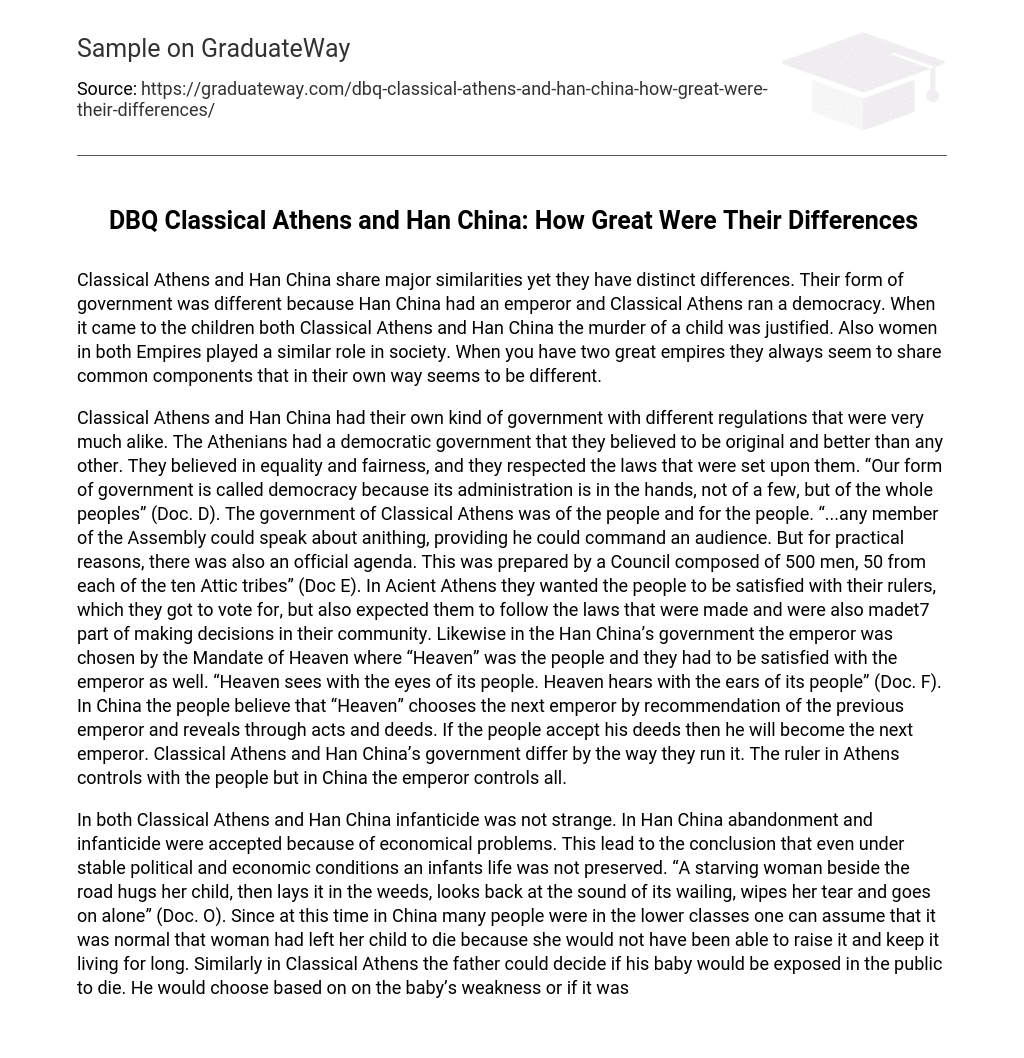Classical Athens and Han China share major similarities yet they have distinct differences. Their form of government was different because Han China had an emperor and Classical Athens ran a democracy. When it came to the children both Classical Athens and Han China the murder of a child was justified. Also women in both Empires played a similar role in society. When you have two great empires they always seem to share common components that in their own way seems to be different.
Classical Athens and Han China had their own kind of government with different regulations that were very much alike. The Athenians had a democratic government that they believed to be original and better than any other. They believed in equality and fairness, and they respected the laws that were set upon them. “Our form of government is called democracy because its administration is in the hands, not of a few, but of the whole peoples” (Doc. D). The government of Classical Athens was of the people and for the people. “…any member of the Assembly could speak about anithing, providing he could command an audience. But for practical reasons, there was also an official agenda. This was prepared by a Council composed of 500 men, 50 from each of the ten Attic tribes” (Doc E). In Acient Athens they wanted the people to be satisfied with their rulers, which they got to vote for, but also expected them to follow the laws that were made and were also madet7 part of making decisions in their community. Likewise in the Han China’s government the emperor was chosen by the Mandate of Heaven where “Heaven” was the people and they had to be satisfied with the emperor as well. “Heaven sees with the eyes of its people. Heaven hears with the ears of its people” (Doc. F). In China the people believe that “Heaven” chooses the next emperor by recommendation of the previous emperor and reveals through acts and deeds. If the people accept his deeds then he will become the next emperor. Classical Athens and Han China’s government differ by the way they run it. The ruler in Athens controls with the people but in China the emperor controls all.
In both Classical Athens and Han China infanticide was not strange. In Han China abandonment and infanticide were accepted because of economical problems. This lead to the conclusion that even under stable political and economic conditions an infants life was not preserved. “A starving woman beside the road hugs her child, then lays it in the weeds, looks back at the sound of its wailing, wipes her tear and goes on alone” (Doc. O). Since at this time in China many people were in the lower classes one can assume that it was normal that woman had left her child to die because she would not have been able to raise it and keep it living for long. Similarly in Classical Athens the father could decide if his baby would be exposed in the public to die. He would choose based on on the baby’s weakness or if it was deformed. “For ten days after birth the father could inspect the baby, and if he found it deformed or weak, he could order it to be exposed in some public place to die” (Doc. N). Although in China the child was assassinated because of economical issues in Athens it was assassinated because of its physical abilities. In Athens they needed strong people to make up their armies so they did not want any weak children. They needed strong healthy babies that would one day be in their armies.
Another similarity these two empires had were that women played an important role in each empire but they were not seen as substantial people. Athenian women were expected to do a lot for the men but they were not taken seriously. They worked alot indoors and outdoors. They were expected to do housework like taking care of the infants. Athenian women also had the responsibility of maintaining the fields. Women did have some rights such as being able to divorce their husbands and remarry. The downfall of this right was that their new husband would not trust them. The women had to obey their husbands and do as they were told. “The courage of a man is seen in commanding, of a woman in obeying -Aristotle, Works, circa 350 BCE” (Doc. Q).
Just as in the Athenian Empire, in Han China the women were expected to be obedient to their husbands. Their women had to be humble, must be diligent, and must be continuing the sacrifices. “There has never been a woman who had these traits and yet ruined her reputation or fell into disgrace on the other hand, if a woman lacked these traits, she will have no name to preserve and will not be able to avoid shame” (Doc. R). In this period of time most empires lived in a patriarchal society where the man was the one in charge making women seem like the lesser being. Women in both empires had their distinct ways of showing their loyalty to men but in the end they were viewed the same way.
We can tell from these documents that Classical Athens and Han China did have their recognizable differences that were in a way related to one another. In Classical Athens they had a more self-governed government whereas for Han China the emperor controlled governed everything. In both empire infanticide was not seen bizarre in their societies. Also in both empires the women had roles that were very much alike and were viewed in a similar manner. These two empires had their differences but they weren’t great differences that set them apart from each other





